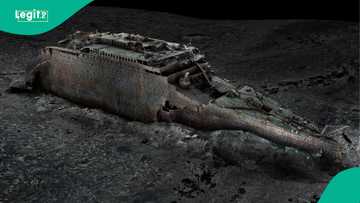New Evidence Shows What Happened During the Final Hours of Titanic Wreck that Killed 1,500 People
- A detailed 3D scan of the Titanic wreck has revealed new insights into the ship's tragic final hours, showing evidence of how the ship broke apart as it sank in 1912
- The scan highlights the heroic efforts of engineers who kept the lights on, enabling safer lifeboat launches, and confirms structural damages caused by the iceberg
- Advanced simulations suggest that small but widespread hull punctures led to the sinking, offering a clearer understanding of the disaster
Don't miss out! Join Legit.ng's Sports News channel on WhatsApp now!
A detailed 3D scan of the Titanic wreck has provided unprecedented insights into the ship’s final hours after it struck an iceberg in 1912, leading to the death of 1,500 passengers and crew.
The "digital twin," created from over 700,000 images using underwater robots, shows the violence of the ship’s break as it sank to the ocean floor.

Source: Getty Images
The bow lies intact as if continuing its voyage, while the stern, 600 metres away, is a mangled heap of metal caused by its impact with the seafloor.

Read also
New digital scan of Titanic ship sheds light on what happened in Atlantic Ocean 113 years ago
Heroic efforts in Titanic’s boiler room
The digital scan highlights the heroic efforts of Titanic engineers in the boiler room, where evidence shows they worked until the end to keep the ship's lights on.
A concave boiler and an open steam valve suggest the power systems were active as the ship sank, enabling safer lifeboat launches.
Parks Stephenson, a Titanic analyst, praised the team led by Joseph Bell for their bravery, stating that their actions saved numerous lives during the chaos.
Simulation explains Titanic’s demise
A simulation using Titanic blueprints and advanced computational modelling revealed that the iceberg left a line of punctures along the ship's hull.
These small, A4-paper-sized holes affected six watertight compartments—two more than the ship could withstand—causing it to sink.
Simon Benson, a naval architecture expert, highlighted how the damage allowed water to flood slowly but persistently, ultimately overcoming the ship’s defences.
New perspectives through mapping technology
The 3D mapping technology offers a comprehensive view of the Titanic wreck, including close-up details such as a porthole smashed by the iceberg.
Survivors’ accounts describing ice entering cabins during the collision align with the new evidence.
Experts now consider the Titanic itself a witness to the tragedy, revealing stories through meticulous analysis of the wreck.
Documentary explores digital resurrection
The findings from the scan feature in the documentary Titanic: The Digital Resurrection, produced by National Geographic and Atlantic Productions.
While the Titanic wreck lies 3,800 metres below the Atlantic’s surface, the scan provides a full visual representation, allowing researchers to study it as if at a crime scene.
Parks Stephenson noted that the wreck continues to reveal its secrets gradually, leaving experts eager to learn more.
Enduring allure of the Titanic
Legit.ng earlier reported that since it sank on its maiden voyage more than a century ago, the Titanic has had an unshakeable grip on the public imagination.
A monument to the technological progress of its time -- and the hubris of men who thought they had built an unsinkable ship -- one of the world's deadliest ocean disasters has inspired books, blockbuster movies, stage productions and countless adventurers who want to see what happened when the luxury liner hit an iceberg.
PAY ATTENTION: Сheck out news that is picked exactly for YOU ➡️ find the “Recommended for you” block on the home page and enjoy!
Source: Legit.ng




